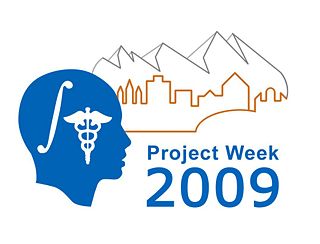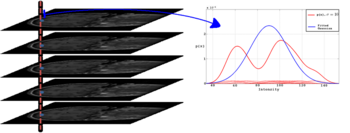2008 Winter Project Week GroupwiseReg
 Return to 2008_Winter_Project_Week |
 Figure 1: On the left is shown a stack of images and a sample pixel stack around a cortical region. On the left is shown the Gaussian(blue) fittet to a real sample from the dataset we used along with the non-parametric density estimate(red). Note that the distribution is bi-modal because of white matter-gray matter transaction. |
Key Investigators
- MIT: Serdar Balci, Polina Golland
- Kitware: Brad Davis
- SCI: Casey Goodlett
Objective
The goal of this project is to come up with an efficient registration code using B-Splines as a deformation model. We explore the space of different optimization schemes e.g. caching, sparsity and memory-speed trade-off's.
Approach, Plan
We run benchmark experiments in the special case of itkMattesMutualInformation implementation. The current implementation in ITK uses caching of B-Spline coefficient in order to speed-up the registration. Also the sparsity of B-Spline coefficient updates are taken into account, yielding and efficient implementation.
The drawback of caching is the use of high amounts of memory. We compare the performance of caching vs. not-caching(computing the coefficients on the fly) by deactivating caching code in itkMattesMutualInformation .
Progress
Jan 2008 Project Week
References
- S.K. Balci, P. Golland, M.E. Shenton, W.M. Wells III. Free-Form B-spline Deformation Model for Groupwise Registration. In Proceedings of MICCAI 2007 Statistical Registration Workshop: Pair-wise and Group-wise Alignment and Atlas Formation, 23-30, 2007.